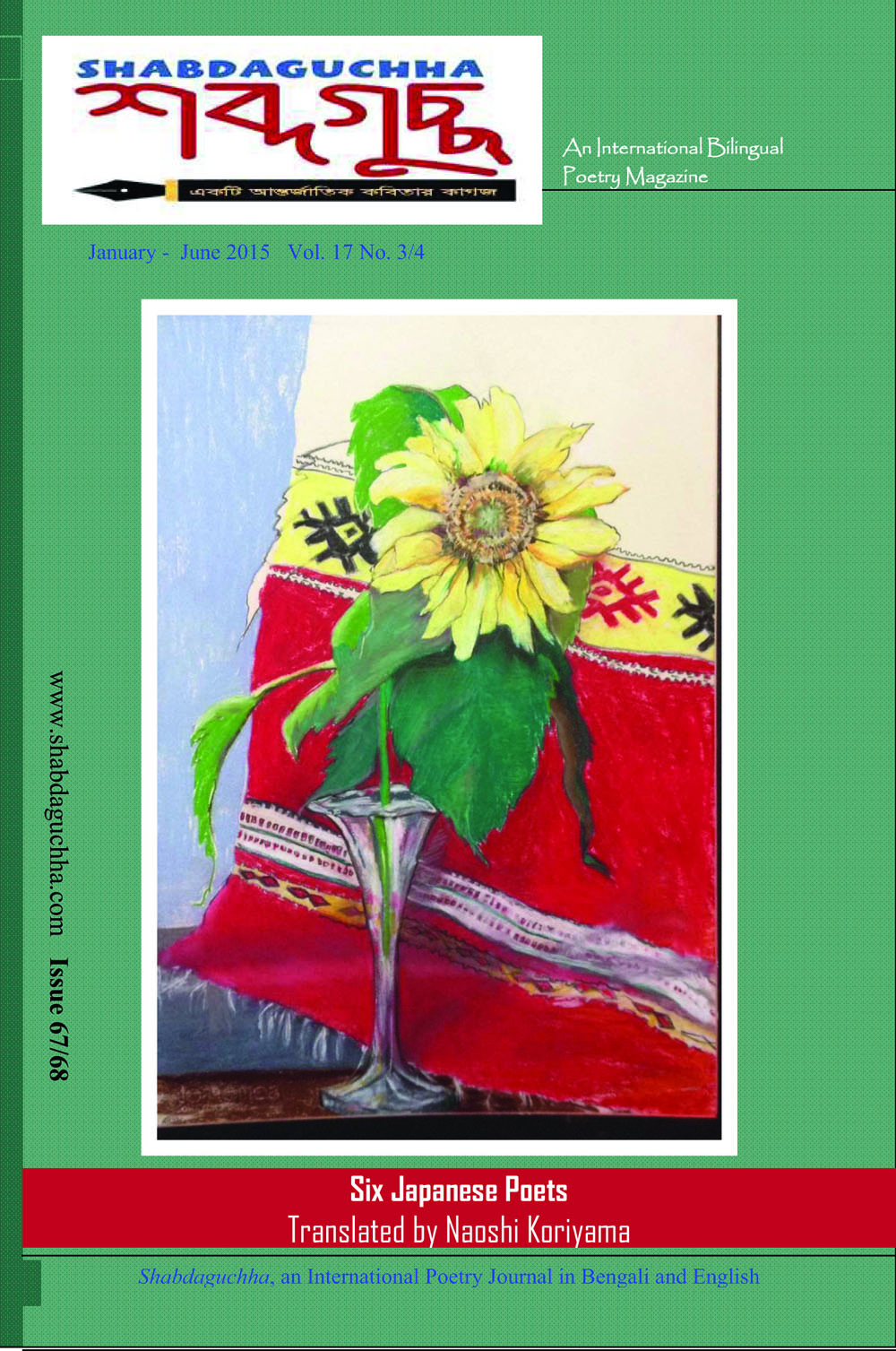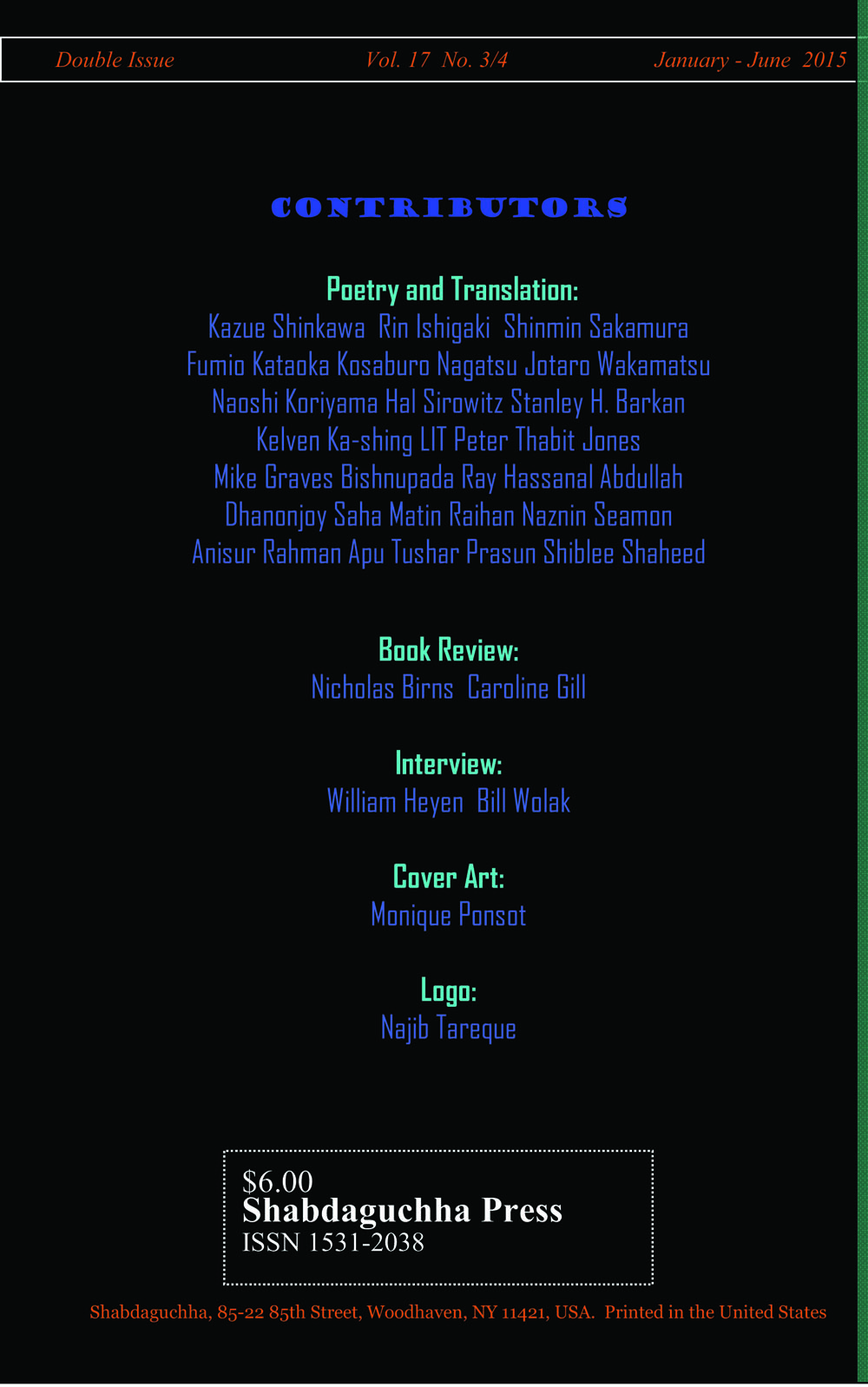|
|

Contributors:
Poets and Translators:
Kazue Shinkawa
Rin Ishigaki
Shinmin Sakamura
Fumio Kataoka
Kosaburo Nagatsu
Jotaro Wakamatsu
Naoshi Koriyama
Hal Sirowitz
Stanley H. Barkan
Kelven Ka-shing LIT
Peter Thabit Jones
Mike Graves
Bishnupada Ray
Hassanal Abdullah
Dhanonjoy Saha
Matin Raihan
Naznin Seamon
Anisur Rahman Apu
Tushar Prasun
Shiblee Shaheed
Book Review:
Nicholas Birns
Caroline Gill
Interview:
William Heyen
Bill Wolak
Cover Art:
Monique Ponsot
New Logo:
Najib Tareque
|
|

 Cover Art by Monique Ponsot
Cover Art by Monique Ponsot
Kosaburo Nagatsu
DID YOU SEE HIROSHIMA?
Did you see Hiroshima?
Have you been to Hiroshima?
I beseech you to visit Hiroshima.
The jumbles of barracks in front of the station have been developed
and department stores have been built.
The fields leading to the army’s drill ground have become the station buildings
for the bullet trains.
Things change in half a century.
We don’t see any scars of war anywhere now.
But people live quietly hiding their scars.
Few are the A-bomb survivors who can talk about their experiences now
and they keep silent, holding their sorrow for having survived.
Soon the temporary barracks have been replaced
with modern residential buildings.
Streets are widened and newly built,
a bit different from what we remember.
New bridges have been built and vehicles are going over them.
Now Hiroshima is a major city for the new century
with a population of 1,200,000.
On that day, high schoolgirls gathered to the first aid station
around Nigitsu Shrine
but now bullet trains dash by on the elevated railways
through the station and a row of buildings.
Am I foolish to try to remember the old Hiroshima?
Or is it too natural that the image of old Hiroshima should fade away?
Are these cries of the shadows in our hearts going to fade away?
Please inhale the air of Hiroshima now!
Did you see Hiroshima?
Please come, visit Hiroshima now.
Please inscribe the image of Hiroshima on your hearts.
Translated from the Japanese by Naoshi Koriyama
(Please read more at the Six Japanese Poets section)
From "An Interview William Heyen"
Bill Wolak: How would you define poetry?
William Heyen: Well, any definition would seem to narrow it. Maybe it has something to do with that which exists beyond paraphrase, beyond interpretation and theory, beyond translation. But I do think that poetry is our only chance as a species to survive on this earth, and I'm not just talking about our lyrics, our word/language constructs, but about a way of thinking that might enable us, as Emerson requires, to "integrate." The poet is the one who integrates, who makes us realize that we of all cultures are in this together, that the bell tolls for all of us, that all is One, in the end, as we move toward our common death. But I don't want to preach about this, or to understand it to the point where I become smug. I just want, by way of sound/story/image/rhythm to find on my own page a poem that is smarter than I am, as Archibald MacLeish says it must be, that has within itself whatever it needs to go on thinking about itself (and us) and its meanings longer than any one of us will. I've written my best poems in a semi-trance, one line appearing after another, rave and dream and song-sound, and have later been surprised at how much has welled up from me into them.
(Please continue reading at the Interview section)
From Book Review
...That this intellectual complexity coexists with a robust and passionate language and an achieved sense of place and feeling means that we now will have to regard Hassanal Abdullah not just as a major figure in contemporary Bengali literature, but as one of the central poets of his generation.
Reviewed by Nicholas Birns
(Please continue reading at the Book Review section)

Find us on Facebook

|
|
Printed Version
পত্রিকার মুদ্রিত কপি
Contents:
Six Japanese Poets
Poetry in English
Poetry in Bengali
An Interview with William Heyen
Book Review in English:
Neon Lights and Lemon-Ice Evenings
Time That Seizez Hands
শব্দগুচ্ছর এই সংখ্যাটির মুদ্রিত সংস্করণ ডাকযোগে পেতে হলে
অনুগ্রহপূর্বক নিচে ক্লিক করে ওয়ার্ডার করুন।
To order for the hardcopy of this issue, please
click on the following link:
Get a Hardcopy
|
|










